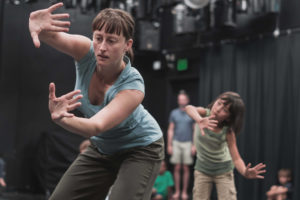Winnipeg: Winter 2018
- Home
- City Reports 2015 - 2019
- Winnipeg: Winter 2018

by Holly Harris
The Winnipeg Fringe Festival, the second largest of its kind in North America, has provided an invaluable showcase for both local and touring dance artists, while introducing new audiences to the art form itself, throughout its 31-year history. This year’s 12-day event in July featured three different dance productions as well as a sneak peek at another that crossed the Atlantic for its international premiere at the Edinburgh Festival Fringe, widely known as the largest arts festival in the world, and trailblazing granddaddy for its eclectic Canadian offspring.
The Body Orchestra, a collective of independent dance artists who are mostly Vancouver-based, presented a mixed bill, Conduit, featuring three contemporary works choreographed during creative residencies at Simon Fraser University’s School for the Contemporary Arts and the Shadbolt Centre for the Arts by the company’s co-artistic directors, Jennifer Aoki and Jenn Edwards. The 60-minute production, performed by a seven-member ensemble at the Royal Manitoba Theatre Centre’s John Hirsch Mainstage Theatre, included terrific original music by Jakob Liljenwall and James Coomber, with dramatic lighting by Jonathan Kim. Each of the short, evocative pieces was abstract in nature, yet conjured potent imagery inspired by TV news, Greek cinema, orchestral conductors and even Donald Trump.
Aoki’s Viewer Discretion begs the question, “Do we control technology, or does it control us?” and included a compelling solo by Erin Lequereux, bristling with street-punk energy. The two remaining works were by Edwards: Other Creatures delves into human communication (or lack thereof), while the title work, Conduit, features gestural movement vocabulary derived from a conductor’s arm movements, including an eye-popping section in which an “orchestra” of six dancers follow the lead of their maestra, Samantha Presley, with their flailing, thrashing bodies.
Winnipeg’s Jolene Bailie’s mixed bill, Game On, presented by Gearshifting Performance Works, offered six retrospective works at the Royal Manitoba Theatre Centre’s Tom Hendry Warehouse — with Bailie making a rare cameo appearance alongside her six-member ensemble.
Bailie fans know her penchant for the absurd, with Lost and Mini Vignettes on Life and Love taking viewers into surrealistic landscapes. Her less-is-more solo, Alex Colville and I (excerpted from her 2014 full-length show Eat All You Want/The Top?), features the lithe artist narrating her own encounter with the late Canadian master painter while balancing a horse’s grooming brush on her forehead.
Game On, performed by Carol-Ann Bohrn, Neilla Hawley and Helene Le Moullec Mancini dressed like cheerleaders, becomes a high-energy romp through a colourful traffic-pylon playground, including bounding leaps and dizzying floor rolls.
One highlight was Altered Aspects with Bohrn, Le Moullec Mancini and Aaron Paul in a graphic explosion of angular choreography. But the 60-minute show’s most potent work proved to be Feedback, in which a seated Bohrn spews a litany of cutthroat criticisms to a stoically dancing Shawn Maclaine — culled from actual rehearsal experiences of brutal honesty in the often take-down world of art-making.
Ming Hon’s Chase Scenes premiered in August at the Edinburgh fringe as one of five productions sponsored through CanadaHub. The work, featuring Hilary Anne Crist, Alexandra Elliott and Hon in a breathlessly paced, 60-minute production inspired by “our collective nightmare of being chased and the manifestation of this in film culture and real-life experience,” had a local sneak peek presentation earlier in July at Winnipeg’s Artspace Building.
A series of 60 “chase scenes,” including such titles as Late to the Gate, Jungle and The Horror!, seamlessly integrated jaymez’s live feed projections with Kayla Jeanson’s original pre-recorded video footage as the three women “cut to the chase,” taking turns re-creating various scenarios from comical to nightmarish. Kudos to these fiercely committed performers for their tightly synchronized movement and ability to maneouver perilous technical challenges that left scarcely room to breathe. However, the show’s intensity, punctuated by copious screams and coupled with the blink-of-an-eye nature of each scene, became exhausting.
Finally, Weather Parade Dance Theatre, founded in 2015 by Ali Robson and Natasha Torres-Garner, presented I Trace You, You Trace Me, in August. It also quickly became a clarion call to action for intergenerational collaborations.
The 45–minute show featured 16 performers aged five to 55, including Robson and Torres-Garner’s own children. The University of Winnipeg’s Asper Theatre for Performing Arts morphed into an enormous playground where the children tumbled, traced shapes on large sheets of paper, and tossed off cartwheels and somersaults, joined by the adults, as an exploration of “play.” Local bassist Ashley Au’s original score and lighting designer Eric Bossé added texture to the otherwise minimal stage design.
Poignantly, a series of duets between the kids and their respective adult partners woven throughout created a wonderfully egalitarian sense of generational continuum, with the performers’ respect for each other palpable. The final duet by two young children provided pure gold at the end as they navigated space wholly in the moment, moving many in the audience to tears with their raw, untempered creativity and innocent trust.

Photo: Mark Dela Cruz
